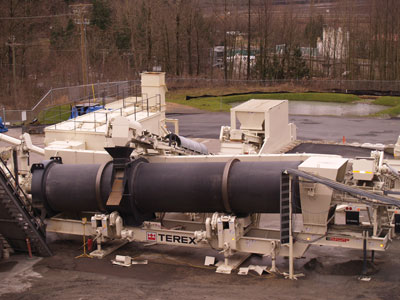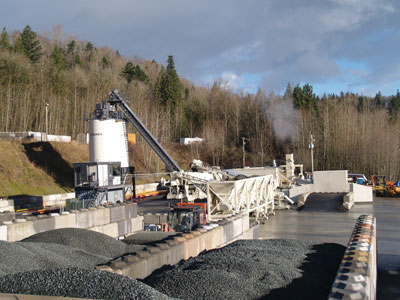
Features
Columns
Education
Breaking the Production Barrier
Contractor builds plant partnership to increase paving flexibility and opportunities.
August 10, 2011 By Rick Zettler
Commercial and small municipal paving contractors often find themselves between a rock and a hard place.
Commercial and small municipal paving contractors often find themselves between a rock and a hard place. Most take pride in being nimble and flexible, selling on the advantage of quickly servicing the needs of the customer more so than the larger, more established asphalt producer/contractor in the area. They make a living on contracts that the “big boys” typically don’t touch.
 |
|
| Pitched at an operating angle to reduce transport and set-up time, the plant’s counterflow drum is capable of producing mix at capacities reaching 225 tons per hour. (Photos courtesy Alpha Asphalt)
|
Often adjusting their paving schedules, these asphalt contractors will commonly work odd hours – nights and weekends – to accommodate customer requests. Yet, most of these “nimble” operations are missing one critical component to the supply chain: the asphalt mix. They are at the mercy of the asphalt producer’s supply schedule.
“We had difficulties getting the mix when we needed it,” comments Harvey Lalli, president of Superior Asphalt Products, Ltd. in Abbotsford, B.C. Even though there were several large asphalt plants in the area, the producers’ paving crews and schedules took precedence, leaving Superior Asphalt without mix and frustrated. “Night and weekends were the hardest times to get mix,” he adds.
Finding a Solution
Superior Asphalt has been part of the Abbotsford paving industry for more than 35 years, providing private, commercial and small municipal paving services. Over the years, the company’s reputation for delivering a quality end product fuelled its growth and the demand for more and more asphalt.
The Abbotsford market is saturated with asphalt plants operated by large regional and multinational producers making mix for a metro population of only about 175,000 people. The fifth largest city in British Columbia, Abbotsford lies just north of the U.S. border and less than 80 kilometres (50 miles) southeast of Vancouver.
As Superior Asphalt’s mix needs grew, so too did the challenge of getting the asphalt from these suppliers when the paving crews needed it. Keenly identifying the problem, the company’s leadership began looking for a solution to get a dedicated provider of asphalt that would be able to supply mix whenever it was needed.
Superior Asphalt considered purchasing a plant of its own, but even with the temperate West Coast climate that allows for year-round paving, the challenge of competing with the established producers made ownership a difficult prospect for the family-run business. So too did the company’s previous experience with an asphalt plant. “My father owned a plant for a while in the 1980s, but he didn’t have the support structure to operate it profitably,” mentions Lalli.
While purchasing a plant outright was not the right prospect for Superior Asphalt, the company had to get control over their mix supply. The fact that they could not get the mix they needed, when they needed it, limited the company’s growth potential.
At about the same time the company was struggling with these supply issues, Alpha Asphalt, a First Nations business, presented a solution to Superior Asphalt. It would allow Superior Asphalt to focus on paving operations, while giving them a dedicated supply of mix to the paving operations.
The Right Fit
In 2010, Superior Asphalt entered into a partnership with Alpha Asphalt Ltd. “As part of the partnership, Alpha Asphalt owns and provides day-to-day operation of the asphalt plant,” explains Randy Rizzo, plant operations manager for Alpha Asphalt.
“Superior asphalt is the primary, dedicated paving contractor to which we supply our mix.”
The two-way relationship also is beneficial to Alpha Asphalt and First Nations people. “This is the first business endeavour in this industry for a First Nations company,” says Chief Justin George, president of Alpha Asphalt and grandson of acclaimed late actor Chief Dan George. “The business will help create employment and economic development for our people.”
With the partnership in place, Alpha Asphalt worked with Roger Johnson Consulting, Ltd. of North Vancouver to search for an asphalt plant that would fit specific criteria. “First, we were looking for a plant that would meet the tough air quality standards for the region,” says Roger Johnson, president of Roger Johnson Consulting. They also carefully considered production capacity and plant configuration. “Second, we looked at smaller plants for Alpha Asphalt that would fulfil the contract with Superior Asphalt but would also leave room for growth,” he adds.
With Abbotsford near British Columbia’s largest metro area, the emissions standards for the region are modelled after some of the most stringent U.S. standards. “We are in a sensitive air-shed area, where people are very concerned about air quality,” mentions Rizzo. Even before the plant was sited, local residents and the local newspaper, The Abbotsford Times, raised fears and concerns over the plant being a potential source of air pollution.
After reviewing several small plant designs, Alpha Asphalt purchased the Terex E225P super portable counterflow drum mix plant from Terex Roadbuilding and financed the deal through Terex Financial Services. “The plant met all the criteria we were looking for,” says Johnson. Capable of producing up to 225 tons per hour, the E225P asphalt plant allows Alpha Asphalt to make mix for Superior’s paving crews plus gives the company additional capacity to make a salable product for other paving contractors.
Built for quick, low-cost portability, the base plant configuration of the Terex E225P can be moved in only five loads: counterflow drum mixer; baghouse; self-erect silo; four cold-feed bins with scalping screen; and liquid AC tank/control house/fuel tank. To facilitate portability, the base plant has only 20 “plug-and-play” cable connections.
Custom Modifications
To meet their specific needs, Alpha Asphalt modified the plant’s configuration. They upgraded to twin 140-ton silos and a 20,000-gallon liquid AC tank, and they added a RAP bin with conveyor. The fuel source for the 75 million BTU drum burner is natural gas. “It’s a cheap and clean fuel source, but you sacrifice some portability,” says Mike Rodriguez, district manager for Terex Roadbuilding.
 |
|
| To lower mix costs, Alpha Asphalt plans to run up to 30% RAP in the mix designs and has the plant plumbed to add the Terex warm mix asphalt system.
|
As equipped, the new plant configuration can be moved in about nine loads. “Our main base of operations will be the Abbotsford location, but we will move the plant should the right opportunity present itself,” says Rizzo.
The plant is sited on Sumas First Nations land in Abbotsford, which is managed by the federal government’s Indian and Northern Affairs Canada (INAC). “This required permission to use the site from the INAC, but Alpha Asphalt was instrumental in helping obtain this approval,” explains Rizzo. “With that hurdle crossed, the next step was the emissions test.”
The E225P includes the latest in clean-running counterflow technology for lowering plant emissions. The plant’s Roto-Aire RA218 baghouse features a 40,000 CMF air flow and 4.5 to 1 air-to-cloth ratio for emissions control.
As soon as the plant was up and running in August 2010, emissions tests were performed. The standards to meet or exceed were: Particulate Concentration of 90 milligrams (mg) per m3; Volatile Organics – 60 mg/m3; Opacity – 20%; and Carbon Monoxide – 200 mg/m3.
“The E225P plant passed with flying colours,” says Rizzo. “Our particulates averaged 60.49 mg/m3, organics were 20.56 mg/m3, opacity was 5% and CO tested at 59.16 mg/m3.”
The Payoff
Perhaps more important than passing the tests, Alpha Asphalt has won public support for the plant. With a preschool located approximately 500 metres from the plant site, Alpha Asphalt is motivated to ensure smooth continuing operations. “We had an open house for neighbours and community members just after opening, and many people could not tell the plant was running,” adds Rizzo. “In addition to low emissions, the plant is very quiet.”
Less than a year into production, the partnership and asphalt plant investment are paying dividends for both Alpha Asphalt and Superior Asphalt. Alpha Asphalt has a dedicated customer purchasing mix from the Sumas First Nations plant site and is making mix for other paving contractors in the area. Superior Asphalt’s overall paving operations are now more efficient and flexible, since they have mix whenever it’s required. They are also seeing new customers. “Our flexibility is opening new doors and opportunities for us,” mentions Lalli.
Rizzo is already looking ahead to the next production phases for the plant. Alpha Asphalt will soon run up to 30% RAP in the mixes, further lowering asphalt production costs. “We also have the plant plumbed for producing warm mix asphalt using the Terex system,” he says. “This will allow us to lower mixing temperatures and further lower plant emissions.”
Out of this unique partnership, frustration has now turned into opportunity and growth, not only for Superior Asphalt but also for the First Nations business of Alpha Asphalt.
Rick Zettler of Z-Comm in Cedar Rapids, Iowa, is an award-winning writer. He researched and wrote this article on behalf of Terex Roadbuilding for Aggregates & Roadbuilding magazine.
Print this page